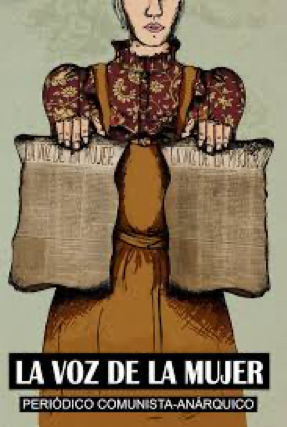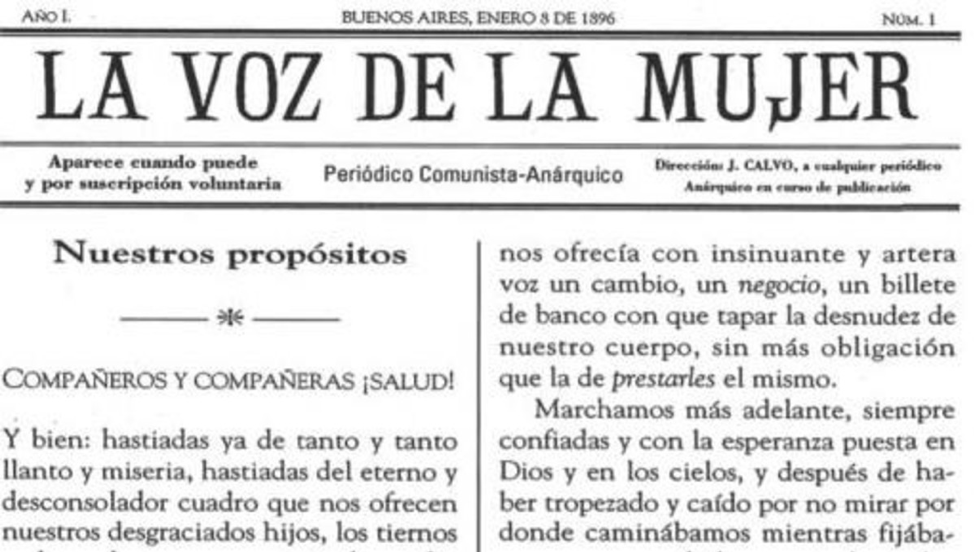
Even though Argentina had gained its independence in 1816 after the Revolution, the colonial structure still remains. Until the end of the 19th Century, Argentine women did not have the right to vote, sue in front of tribunals, represent themselves in court, write public documents and inherit family possessions. They had no legal guardianship of their sons either. Home was considered as their destiny, and they were born to be “caring creatures” to serve men and children. Nevertheless, gender roles evolved when women started to participate in the labor force. By 1895, 20% of women had jobs in Argentina. They worked as teachers, office secretaries, domestic workers and seamstresses, as well as in dry-clean services and cigarette productions. Regardless of the gradual participation in labor, they had to take care of children during their lunch breaks and after work hours, clean their houses and prepare meals. They were paid less than their male coworkers and could only do lower-level jobs.
“La Voz de la Mujer” was founded by a group of anarchist and communist women at the end of the 19th century. Some women editors were immigrants from Spain and Italy who wanted to move to Argentina for new opportunities. These women aimed to fight against the country, church and family oppression in a patriarchal society with their slogan of “ni Dios, ni patrón, ni marido” (Not god, not boss, not husband). Editors wrote that they were “weary of asking and begging, being toys, objects that bring pleasures to our infamous exploiters and horrible husbands, we have decided to raise our voice in the society and demand our pleasures in our banquet of life” on January 8th of 1896 for their first publication. Many feminist poems and op eds were published to question traditional gender roles and men’s authority over women by using ironies and metaphors. The magazine covered different topics such as politics, religion, sexuality, poverty and workplace oppression. “La Voz de La Mujer” was an example of early feminist movement at the end of 19th Century under a neocolonial and patriarchal society. Women had higher levels of awareness about gender inequality and oppression as a result of their labor participation.

“La Voz de La Mujer” was the first feminist publication in Argentina, and many historians regard this magazine as a progressive movement in modern Argentine history. Nowadays, people still continue to fight for gender equality and break the silence after the inspiration of “La Voz de La Mujer”. In 2015 #NiUnaMenos feminist movement started in 2015 to fight for gender justice and protest against ongoing femicide cases across the country. Argentine women activists posted on social media platforms and asked, “Are we not going to raise our voice? [Those men] are killing us”. Some people might disagree with feminist movements by saying that women are destined to stay home and should not rebel. For example, an Argentine writer and poet Leopoldo Lugones at the end of 19th Century argued that “home…is incompatible with politics and civic teachings.” Arguments about women’s rights will always be controversial in Argentina, as one party seeks for equality and breaks the traditional feminine concept while the other maintains the oppression. Nevertheless, a group of progressive women would keep fighting for their rights and breaking gender norms over time.
References:
Bazán, Jazmín. (January 8, 2019). “La voz de la mujer”: el periódico feminista que hablaba de “amor libre” hace 123 años. Clarín. https://www.clarin.com/entremujeres/voz-mujer-periodico-feminista-hablaba-amor-libre-hace-123-anos_0_EPG1ak6iA.html. Accessed March 23, 2020.
Lescano, Aimé. Concepciones sobre la mujer Argentina a principios del Siglo XX: entre “el problema feminista” y “la voz de la mujer”. VI Congreso Internacional de Investigación y Práctica Profesional en Psicología XXI Jornadas de Investigación Décimo Encuentro de Investigadores en Psicología del MERCOSUR (2014). Facultad de Psicología – Universidad de Buenos Aires, Buenos Aires. https://www.aacademica.org/000-035/112.pdf
La Voz de La Mujer Periódico Comunista Anárquico. Bogotá, Colombia: Un Gato Negro Ediciones, 2011. https://libcom.org/files/LaVozdelaMujer.pdf.
